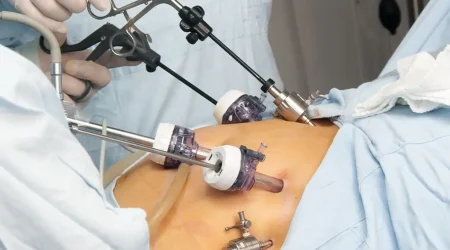Gastric bypass surgery reduces stomach size and bypasses part of the small intestine, leading to significant weight loss and improved health.
Accomodation
Operation Duration
Recovery Duration
Follow-Up Visit







Gastric bypass, also known as Roux-en-Y gastric bypass, is one of the most effective and well-established bariatric surgery procedures designed to help individuals struggling with severe obesity achieve significant and sustained weight loss. By altering the digestive system, this surgery reduces the stomach’s capacity and changes how food is absorbed, leading to a decrease in calorie intake and efficient long-term weight loss.
Gastric bypass surgery involves two major steps:
Reducing the Stomach Size: The surgeon creates a small pouch at the top part of the stomach, drastically reducing its size. This new, smaller stomach can hold much less food than before, which leads to feeling full after eating smaller portions.
Bypassing a Portion of the Small Intestine: The new stomach pouch is directly connected to the small intestine, bypassing a portion of it. This rerouting reduces the absorption of calories and nutrients, further contributing to weight loss.

Gastric bypass surgery is typically recommended for individuals with a body mass index (BMI) of 40 or higher, or those with a BMI of 35-39.9 and obesity-related health issues like diabetes, heart disease, or severe joint problems. A thorough evaluation by a bariatric surgeon and a multidisciplinary team is necessary to determine eligibility.
Pre-Surgery Evaluation and Preparation: Before surgery, patients undergo a comprehensive medical evaluation, including blood tests, imaging, and consultations with nutritionists and psychologists. Patients are also educated about lifestyle changes and post-surgery requirements.
The Surgery: Gastric bypass is typically performed laparoscopically, meaning it involves small incisions and the use of a camera for minimally invasive surgery. The procedure takes about 2-4 hours and requires general anesthesia.
Post-Surgery Recovery: Most patients stay in the hospital for 2-3 days. During recovery, the patient follows a strict liquid diet, slowly transitioning to soft foods and eventually to solid foods under the guidance of a nutritionist.
Long-Term Follow-Up: Regular follow-up appointments with the bariatric team are crucial for monitoring weight loss progress, nutritional intake, and overall health. Dietary supplements, such as vitamins and minerals, are often necessary to prevent deficiencies due to reduced absorption.
The surgery itself is performed under general anesthesia, so there is no pain during the procedure. Some discomfort or soreness may be experienced in the days following the surgery, but this can be managed with prescribed pain relief. Most patients return to their regular activities within 2-4 weeks.
Gastric bypass requires a commitment to lifestyle changes, including:
Gastric bypass surgery is not just about losing weight—it can dramatically improve your health and well-being. With the right support and dedication, this procedure can lead to lasting weight loss, better management of obesity-related conditions, and a new lease on life.
Gastric bypass surgery is a weight-loss procedure that involves creating a small stomach pouch and rerouting the small intestine. This reduces the amount of food you can eat and decreases calorie absorption.
Gastric bypass is highly effective, with most patients losing 60-80% of their excess body weight within the first two years after surgery.
The surgery is performed under general anesthesia, so patients are not awake or in pain during the procedure. Postoperative discomfort is manageable with medication, and pain levels typically decrease within a few days.
Most patients spend 2-4 days in the hospital and can return to normal activities within 3-6 weeks, depending on individual recovery and adherence to postoperative care instructions.
While gastric bypass is generally safe, potential long-term risks include nutritional deficiencies, dumping syndrome, and the need for follow-up surgeries. Regular medical check-ups and adherence to dietary guidelines help manage these risks.

ŞANSEL KAVLAKOĞLU SAĞLIK HİZMETLERİ LİMİTED ŞİRKETİ
İzzet Paşa Mah Yeni Yol Cad. No:22/A Nurol Tower Plaza Kat:11 No: 1103 Şişli, İstanbul, Turkey
Mednificant holds an international health tourism accreditation. Our affiliated hospitals and clinics are accredited to both national and international standards, and all treatments are provided at these accredited health facilities.